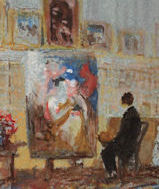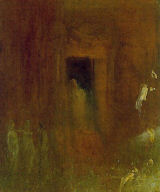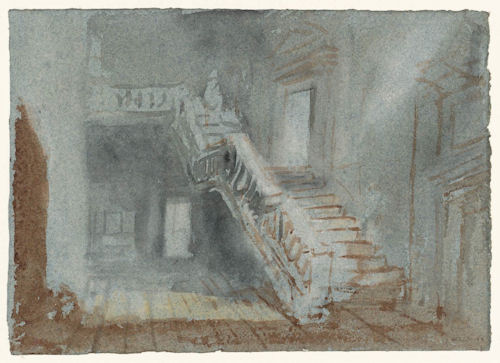




In the best mystery novels, certain seemingly offhand observations will pass unnoticed until the final unmasking of the perpetrator, when a rereading of earlier chapters proves crucial to an understanding of the ingenious puzzle.
In Austen's Pride and Prejudice, each of the early chapters contains its share of offhand lines and seemingly artless observations. But here is no attempt to mystify: on the contrary, nothing at the end should be a surprise, because all in this Novel will have been anticipated in the introductory chapters, and can lead to no other conclusion.
— Which is not to say that we won't be tempted to reread, only that our interest is not on the manner in which we have been tricked and misdirected, but only on how we have failed to take due note of what has been there always.
A mystery novel is also noteworthy for its characters and situations which exist merely to draw suspicion to themselves and away from the actual murderer. Pride and Prejudice contains a great many characters and situations, none of them incidental or unimportant. And once the Novel attains the lofty upper reaches of that literary mansion, every personage on the lower level will have been given the means to support an impressive amount of weight upon his or her shoulders.
* * * * *
We become further acquainted with Elizabeth's friend Charlotte Lucas in Chapters Five and Six:—
'His pride,' said Miss Lucas, [with the exception of Jane, Charlotte Lucas will be Mr. Darcy's lone defender] 'does not offend me so much as pride often does, because there is an excuse for it. One cannot wonder that so very fine a young man, with family, fortune, every thing in his favour, should think highly of himself. If I may so express it, he has a right to be proud.'
'That is very true,' replied Elizabeth, 'and I could easily forgive his pride, if he had not mortified mine.' [Chapter Five]
In Chapter Six Elizabeth confides to Charlotte a satisfaction that Jane has refrained from displaying too marked a preference for Mr. Bingley, such as to
... 'guard her from the suspicions of the impertinent.'
Charlotte believes otherwise:—
'If a woman conceals her affection with the same skill from the object of it, she may lose the opportunity of fixing him; and it will then be but poor consolation to believe the world equally in the dark ... In nine cases out of ten a woman had better shew more affection than she feels ... When she is secure of him, there will be leisure for falling in love as much as she chuses.'
'Your plan is a good one,'
replied Elizabeth ... 'and if I were determined
to get a rich husband, or any husband, I dare say
I should adopt it.'
...
'Well,' said Charlotte ...
'Happiness in marriage is entirely a matter
of chance ... it is better to know as little as
possible of the defects of the person with whom
you are to pass your life.' [Chapter Six]
Elizabeth laughingly protests that Charlotte would never act in this way herself.
* * * * *
Foreshadowing is, I believe, the proper term for the previous interlude, which unkind fate will lose no time in transforming from theory to the actual, thereby affecting the lives of Jane, Mr. Bingley, Elizabeth, and Charlotte herself. But the next-cited scenes demand far stronger descriptive words; irony, certainly, but also hubris, and even Greek tragedy might not be overstatement.
It begins during Mrs. Bennet's visit (less to see Jane than to prevent her leaving Netherfield), as she remarks to Mr. Bingley:
... 'I do not know a place in the country that is equal to Netherfield. You will not think of quitting it in a hurry I hope, though you have but a short lease.'
'Whatever I do is done in a hurry,' replied he; 'and therefore if I should resolve to quit Netherfield, I should probably be off in five minutes. At present, however, I consider myself quite fixed here.' [Chapter Nine]
Mr. Darcy reminds Bingley of those declarations later that same day:—
'The power of doing any thing with
quickness is always much prized by the possessor, and
often without any attention to the imperfection of
the performance. When you told Mrs. Bennet this
morning that if you ever resolved on quitting
Netherfield you should be gone in five minutes,
you meant it to be ... a compliment to yourself ...
'I dare say you believed it;
but ... your conduct would be quite as dependant
on chance as that of any man I know, and if, as
you were mounting your horse, a friend were to
say, 'Bingley, you had better stay till next week,'
you would probably do it ... might stay a month.'
'You have only proved by this,' cried Elizabeth, 'that Mr. Bingley did not do justice to his own disposition. You have shewn him off now much more than he did himself .... To yield readily — easily — to the persuasion of a friend is no merit with you.'
'To yield without conviction is no compliment to the understanding of either,' is Darcy's response.
'You appear to me, Mr. Darcy, to allow nothing for the influence of friendship and affection ...' [Chapter Ten]
* * * * *
In the next chapter Miss Bingley declares:
... 'As to laughter, we will not expose ourselves, if you please, by attempting to laugh without a subject ...'
'Mr. Darcy is not to be laughed at!' cried Elizabeth. 'That is an uncommon advantage, and uncommon I hope it will continue, for it would be a great loss to me to have many such acquaintance. I dearly love a laugh.'
Mr. Darcy points out that the wisest and best of men, and even the wisest and best of their actions, may be rendered ridiculous by a person whose first object in life is a joke, and Elizabeth replies, that though such persons exist, she hopes that she never ridicules what is wise or good:—
'Follies and nonsense, whims and inconsistencies do divert me ... and I laugh at them whenever I can. — But these, I suppose, are precisely what you are without.'
... 'It has been the study of my life to avoid those weaknesses which often expose a strong understanding to ridicule.'
'Such as vanity and pride.'
'Yes, vanity is a weakness indeed. But pride — where there is a real superiority of mind, pride will be always under good regulation.'
Elizabeth turns away to hide a smile. And when Miss Bingley demands to know what is the result of her examination of Mr. Darcy, responds:—
'I am perfectly convinced by it that Mr. Darcy has no defect. He owns it himself without disguise.'
Darcy answers that he has made no such pretension, that he has faults enough, but not, he hopes, of understanding. He admits his temper to be too unyielding, and would perhaps be called resentful:—
'My good opinion once lost is lost for ever.'
'That is a failing indeed!' cried Elizabeth. 'Implacable resentment is a shade in a character. But you have chosen your fault well. — I really cannot laugh at it; you are safe from me.'
Noteworthy, of course, is the fact that these scenes (and many more besides) demonstrate Elizabeth's pride in her discernment and ability to judge others correctly. We might, of course, say the same about Mr. Darcy.
It seems to me that if Chapters One and Two form the Novel's cornerstone, then Chapter Three (The Meryton Assembly), together with Chapters Four to Twelve inclusively (Netherfield), form a true foundation of the Novel. After assigning the word base in place of cornerstone [A History of Architecture, Glossary, Page 966], Sir Banister in the succeeding paragraph replaces foundation with basement [The lowest stage of a building; also applied to an underground storey]. He then refers to beautiful illustrations of Whitehall Palace, London (Page 789 C plans of Inigo Jones), and Belton House, Grantham, Lincolnshire (Page 817 B). [The entire book is available online at archive.org or new from Amazon.]
And who am I to disagree? A basement isn't mere blank supporting walls, as I envisaged an architectural foundation, but a storehouse for all the essential human lifelines to the main or upper parts of a mansion:— kitchens, pantries, storage areas, wine cellars, water, wood or other fuel supplies for heating and cooking, and everything else I've overlooked.
* * * * *
Pictures 3A
With the exception of Photos from film promotions in webpage
Introduction 3A, and the Hubble Footer,
most Pictures on these Pride and Prejudice and other
Austen webpages, are from the
Turner Bequest of the Tate Museum
Collection Online.
This Page Chapters 1 to 12:
Foundation (3), Foreshadowing, or Moving Up
 JMW Turner, 1818
JMW Turner, 1818
Title: Farnley Hall from the East
Medium: Bodycolour and chalk on paper
Support: 311 x 394 mm
Private Collection, Turner Worldwide
Reference: TW0240, Wilton 587
 JMW Turner, 1827
JMW Turner, 1827
An Artist Seated before Sir William Beechey's Portrait 'Mrs Hasler as Flora' 1827
Medium: Gouache and watercolour on paper;
Dimensions: Support 140 x 193 mm
Collection: Tate, Accepted by the nation as part of the Turner Bequest 1856
View by appointment at Tate Britain's Prints
and Drawings Room
Reference D22682
 JMW Turner, 1830
JMW Turner, 1830
Title: Interior of a Great House: The Drawing Room, East Cowes Castle, circa 1830
Medium: Oil Paint on canvas
Support: 908 x 1219 mm
Frame: 1239 x 1550 mm
Collection, Tate, Accepted by the nation as part of the Turner Bequest 1856
On display at Tate Britain, Theme Turner Collection, Room: In the Studio
Reference NO 1988
Matthew Brennan argues in his article “Turnerian Topography: The Paintings of Roderick Usher” that Roderick Usher’s paintings are most aptly paralleled by the paintings of JMW Turner. Turner, like the paintings the narrator describes in the story, emphasizes his use of light and color to depict the image, rather than making the image more concrete
Detail, Painting, JMW Turner
 The above citation is from an
intellectually stimulating, and visually beautiful website
[name of contributor to this WordPress site?]
devoted to this particular Turner painting, and to a 1990 Essay
by Matthew Brennan concerning Roderick Usher, the painter
described by the narrator in Edgar Allan Poe's The Fall
of the House of Usher. I've used the painting, and in
particular the arresting Detail image shown at left from
the said website to add impact to this my final Foundation level
Pride and Prejudice webpage.
The above citation is from an
intellectually stimulating, and visually beautiful website
[name of contributor to this WordPress site?]
devoted to this particular Turner painting, and to a 1990 Essay
by Matthew Brennan concerning Roderick Usher, the painter
described by the narrator in Edgar Allan Poe's The Fall
of the House of Usher. I've used the painting, and in
particular the arresting Detail image shown at left from
the said website to add impact to this my final Foundation level
Pride and Prejudice webpage.
[Note that I have verified that the Great House referred to
in the title of the painting is indeed 'The Drawing Room at East Cowes Castle']
 JMW Turner, 1827
JMW Turner, 1827
The Old Library Staircase 1827
Medium: Gouache and watercolour on paper;
Support 137 x 190 mm
Collection: Tate, Accepted by the nation as part of the Turner Bequest 1856
View by appointment at Tate Britain's Prints
and Drawings Room
Reference D22757
________________________